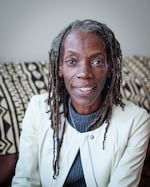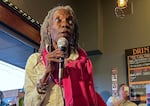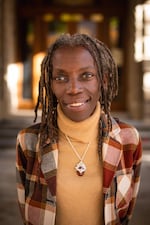Editor’s note: This is part of a package of stories profiling the two candidates for Portland City Council in the Nov. 8 election, Commissioner Jo Ann Hardesty and challenger Rene Gonzalez. You can read their answers to questions about the biggest challenges facing Portland here and here.
Over breakfast in an East Portland diner, Portland City Commissioner Jo Ann Hardesty keeps returning to the same point: she has spent the last four years doing exactly what she promised.
In 2018, Hardesty rode into office promising to help those who had been left behind by City Hall — renters, people of color, low-income Portlanders, and those living east of 82nd Avenue, an area of the city that has long been historically ignored by Portland leaders and which she calls home.

Jo Ann Hardesty, candidate for Portland City Council, 2022.
Courtesy of Jo Ann for Portland
It’s in this long-ignored part of the city, specifically in an Elmer’s Restaurant near what’s left of Mall 205, that Hardesty pronounces her first term a success.
“I’m the only person today on Portland City Council that consistently speaks up for working people and for people who’ve had no voice at City Hall,” she said over over-medium eggs and crispy bacon. “I’ve done that since day one. I will do that until my very last day on the council.”
That day could be coming sooner than she expected.
Just two years ago, as thousands of Portlanders took to the streets demanding more accountability from the police, political insiders speculated that Hardesty, a longtime advocate for more police oversight, could easily snatch the mayor’s seat one day. Fast forward to today, and she very well may lose her City Council seat after just one term.
Hardesty, the first Black woman elected to citywide office in Portland, has found herself in an unexpectedly tight race for reelection against Rene Gonzalez, a centrist businessman with no prior political experience but who has found deep support with his pledge to crack down on homelessness and crime.
With voters seething over rising crime and tents lining many city blocks, polls show Gonzalez’s pitch to eliminate outdoor camping and ramp up arrests for low-level crimes is landing — while Hardesty, who is perhaps best known on council for advocating against homeless sweeps and scrutinizing the police force, is in jeopardy.
Many of these frustrated voters say they blame four years of Hardesty’s ultra-progressive politics for the city’s problems — even though, she emphasizes, she is one of five city leaders who share responsibility for steering city policies and overseeing city agencies. Most recently, she’s run the civic life, transportation and fire departments.
But over the course of the last four years, Hardesty has been one of the loudest voices on council on homelessness and policing. And, warranted or not, it’s her voice voters remember as they survey a city in distress.
“I sell insurance, right? So I get calls every day of people breaking into gas tanks, people taking catalytic converters, people doing petty theft,” said Andrew Zimmerman, as he grabs a poke bowl from a food cart pod a few blocks west of Elmer’s.
Zimmerman, 47, says he wouldn’t normally vote for Gonzalez who is “a little right of where I lean politically.” But there’s appeal in Gonzalez’s pledge to end public outdoor camping. Zimmerman, who purchased his home in Portland’s Hazelwood neighborhood in 2005, said he hasn’t been able to use his MAX stop recently because it’s crowded with tents occupied by people openly cooking meth. As an insurance salesman, his work days are filled with people reporting similar mayhem.
Asked who should bear the blame for the city’s dysfunction, he didn’t miss a beat.
“It’s definitely Hardesty,” he said.
At this point, Hardesty said she’s used to some voters’ insistence that she is to blame for Portland’s many problems. Overcoming the sentiment remains her biggest barrier to keeping her seat.
“There are people that want the public to believe that every bad thing that has happened in Portland in the last three years is my fault,” she said. “And every good thing somebody else did.”

Portland City Commssioner Jo Ann Hardesty speaks to supporters on election night at the Redwood Cafe on May 17, 2022 in Portland, Ore.
Rebecca Ellis / OPB
Promises fulfilled
Whether you support or oppose her, it’s undeniable that Hardesty has left a mark on her city.
Just look at East Portland. The neighborhood of Lents was the first to receive help from the Portland Street Response, a program that dispatches a team of health workers and paramedics to 911 calls concerning people in a mental health crisis. Over her time in office, Hardesty turned the program from an idea to the city’s most promising police alternative. The unarmed emergency response program now responds to people in crisis citywide.
She also led the creation of the Portland Clean Energy Fund, a tax-funded program created by voters that doles out grants to fight climate change and social inequality. The fund is now overseen by Commissioner Carmen Rubio, who has promised to overhaul the program after a withering audit and an award of $12 million to an executive who once defrauded an energy company. So far, the program has funded the rehabilitation of 42 units of affordable housing, the planting of 1,700 trees, and workforce training for a handful of East Portland residents, according to a list of grant recipients.
She helped transfer control of 82nd Avenue, one of the city’s most dangerous roads for pedestrians, from the state to the city after multiple pedestrian deaths and decades of bureaucratic wrangling. Tens of millions of dollars have since been earmarked for safety improvements for the orphan highway.
“I feel like she’s done so much for the East Portland Community, which is what she promised she would do,” said state Rep. Khanh Pham, a Democrat who represents East Portland and worked with Hardesty on the plan to transfer control of 82nd Avenue.
And yet, it’s East Portland residents like Zimmerman who appear to be some of the most frustrated with Hardesty. An Oregonian/OregonLive analysis of voting data from the May primary found Hardesty had done well in the politically liberal neighborhoods of inner Northeast and Southeast Portland. But she won less than 35% of the vote across East Portland precincts, which tend to vote more conservative than the rest of the city. The outlet released a poll last week that found Hardesty trailed Gonzalez 6% to 54% east of Interstate 205.
While trailing in East Portland, Hardesty has held on to support from a broad coalition of left-leaning politicians and advocacy groups. SEIU Local 49, APANO, the Latino Network, United Oregon, and Pro-Choice Oregon have all endorsed her as has U.S. Sen. Jeff Merkley, U.S. Rep. Earl Blumenauer, Multnomah County District Attorney Mike Schmidt, and City Commissioner Carmen Rubio.
Pham said she believed the seemingly low level of support in East Portland was due to disconnected voters. East Portland voters, like voters across the city, she said, are blaming Hardesty for problems far outside her control and more in the realm of Commissioner Dan Ryan, who oversees the housing bureau.
“A lot of times people don’t know who’s responsible,” she said. “I find it baffling that Hardesty isn’t even the housing commissioner, but she’s borne the brunt of all the criticisms of the lack of progress on housing and the housing crisis.”
Pollster John Horvick said a similar phenomenon played out after the 2020 mayoral election, in which Mayor Ted Wheeler faced off against Sarah Iannarone, who ran far to his left and had made East Portland voters an integral part of her campaign. Yet it was Wheeler, ultimately, who won east of 82nd Avenue.
“It’s not just this cycle,” he said. “Something is happening in East Portland where those voters are not resonating as much with the candidates who I think see themselves as being the strongest advocates for lower-income communities [with] high concentrations of folks of color.”
Horvick says part of the reason Hardesty could be trailing so significantly in East Portland right now is that it’s the area in the city where residents seem most concerned about homelessness and crime. His firm did a poll in May for the city of Portland that found 69% of people who lived east of I-205 did not feel safe walking alone at night. Portlanders who lived in the area were also most likely to report that homelessness has increased in their neighborhood.
“All those serious problems — crime, homelessness, feeling not safe in your neighborhood — folks in East Portland just feel worse off in all those dimensions,” he said. “So if crime and homelessness is your issue, and you’re not happy with the status quo, and you feel like you’re having those problems more than other parts of the city, maybe you don’t vote for the incumbent.”
But Horvick said there’s also likely something about Hardesty’s progressive policies that are unattractive to frustrated voters across the city right now. Critics charge that her opposition to sweeping camps has allowed outdoor tent cities to proliferate and her 2020 calls to cut police funding are at the root of an underperforming police department.
In retrospect, the $15 million in cuts were a drop in the bucket. The police bureau now has its largest police budget in history. But many voters still believe the bureau’s budget was dramatically slashed — and she’s to blame.
The criticism of Hardesty has often seemed deeply personal, far more intense than what any other commissioner receives. Hardesty has said her office — and her home — have been flooded with racist messages over her four years in office, and estimated she blocks “at least 50″ people espousing white supremacist views on social media every other day. Many appear to be from out of state, she said, possibly learning about her due to the prominent role she played in the 2020 racial justice protests.
“There are folks that want to paint me as Antifa or the face of the ‘defund the police movement,’” she said. “But it was never my movement. It was the thousands of people that took to the street over a hundred plus days that demanded the City Council act.”

Jo Ann Hardesty outside City Hall in Portland, Ore., on Oct. 23, 2019. Hardesty won election to City Council in 2018, becoming the first woman of color to serve on the governmental body.
Cheyenne Thorpe / OPB
Looking forward
Hardesty may be facing strong anti-incumbent headwinds. But, in an interview, the commissioner struggled to entertain the thought that her term might come to an end after just four years.
“Without me, then we will have a council that will go back to ‘Kumbaya and everything’s fine. Nothing to see here. Nothing to worry about,’” she said.
While most of her colleagues prefer to do their wheeling and dealing behind the scenes, Hardesty has no problems speaking bluntly about her fellow commissioners and their proposals — even if it might cause tensions down the road. In an hour-long interview, with a recorder just inches away, she critiqued the mayor’s recent string of emergency orders (“an illusion of activity”), Commissioner Mingus Mapps’s push to fund the Frog Ferry (“I wish he would do more of his homework before he would come up with his proposals.”) and Commissioner Dan Ryan’s slow roll-out of his six outdoor homeless camps known as safe rest villages (an issue, she says, of “leadership, honestly, because I would not have that kind of problem.”)
“I did not come here to make friends,” she said. “I came to change systems so that they would work for working people.”
This systemic change, she argues, isn’t complete.
She still wants to see more varied types of shelter for people experiencing homelessness and believes the city isn’t acting with enough urgency to create outdoor homeless shelters where people can receive services. Hardesty said, if she had her way, she would immediately locate 40 places across the city where people could camp, distributed evenly across the city’s 90-plus neighborhoods.
Asked why she didn’t push through the concept in her first term, she said it would have required overseeing the housing bureau, currently led by Ryan.
“People want to know: ‘Where do you want me to move?” We should have answered that question a long time ago,” she said. “A city that owns five golf courses, X number of parks, there’s no reason why we have not actually figured out where people can safely camp and bring those services to them.”
And she said she still has work to do expanding the Portland Street Response and delivering on her promise to voters to establish a new system for ensuring civilian oversight of Portland police. Voters handily approved the creation of a new oversight board with the power to discipline and fire officers in November 2020. The board, which was championed by Hardesty, has been slow to get started. She said she expects the board to begin functioning next year.
In the event voters boot her from office, Hardesty said she believes the board will be able to get off the ground without her. And the longtime activist said she’ll find some other way to oversee the police bureau — just back on the outside.
“I spent 30-plus years advocating at City Hall for police accountability before I had the privilege of serving in this seat,” she said. “That won’t change if I’m not in this seat.”
